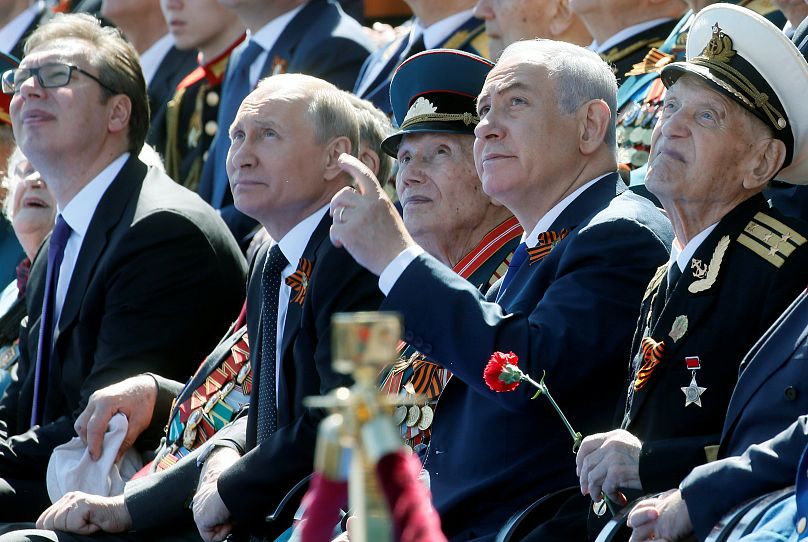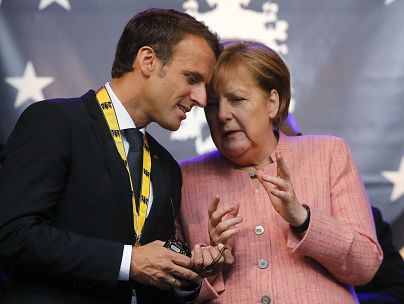How serious is the escalation in hostilities between Israel and Iran? What's been the international reaction to the clashes in Syria?
Israel says it attacked almost all of Iran’s military infrastructure in Syria on Thursday after Iranian forces fired rockets at Israeli-held territory. The clashes have been described as the most serious since the start of the Syrian civil war in 2011.
 ADVERTISEMENT
ADVERTISEMENT
 ADVERTISEMENT
ADVERTISEMENT
What exactly happened between Israel and Iran?
Israel says Iran launched a rocket attack on the Golan Heights, Israeli-occupied territory captured by Israel from Syria in 1967. It claims the Quds Force, a branch of Iran’s Revolutionary Guards, carried out the assault and that 20 Iranian rockets were either shot down by Israel’s Iron Dome air defence system or did not reach their targets.
In response, Israel’s military says it destroyed dozens of Iranian military sites and Syrian anti-aircraft units. Syria says Israel launched dozens of missiles and hit a radar station, air defence positions and an ammunition dump.
Iran has been coy about its own alleged involvement but has strongly condemned the Israeli attacks and the world’s reaction – or lack of it. “The international community’s silence encourages Israel’s aggression. Syria has every right to defend itself,“ Syrian state TV quoted Foreign Ministry spokesman Bahram Qasemi as saying on Friday.
How has Washington responded?
The confrontation came two days after US President Donald Trump announced the United States’ withdrawal from the 2015 international nuclear accord with Iran, a move welcomed by Israel and Saudi Arabia.
“The Iranian regime’s deployment into Syria of offensive rocket and missile systems aimed at Israel is an unacceptable and highly dangerous development for the entire Middle East,” the White House said.
One of the reasons for the Trump administration’s rejection of the Iran nuclear deal is Tehran’s activities and military interventions in the region, which the US president says the accord does not address.
Russia is friends with Israel and Iran. What is Moscow’s stance?
Russia is heavily involved in Syria, has friendly relations with Israel but is on the same side as Iran in fighting to support the Assad government. Moscow has called on both sides to show restraint and resolve differences through diplomatic means.
Just hours before the Israeli strikes, Israeli Prime Minister Benjamin Netanyahu was being welcomed in Moscow by President Vladimir Putin for the May 9 Victory Day parade. The two leaders reportedly spent 10 hours together.
Netanyahu – already emboldened by President Trump’s support – was bullish when he reported back to the Israeli cabinet on Thursday, saying he had “no basis to think” that Russia would try to curb Israel’s action. He stressed the need for military coordination with Moscow and claimed Russia had agreed to delay a sale of weapons to Syria.
Observers have noted Russia’s lack of condemnation of Israel, whereas Moscow did criticise an Israeli strike on Syria in April. Some analysts have suggested that Russia looks set to tolerate the Israeli action as long as Moscow’s own interests – above all its support for Assad – are not endangered.
Can Europe do any more than wring its hands?
Europe is already reeling from Trump’s withdrawal from the Iran nuclear deal, which threatens European businesses who now face US sanctions if they continue trading with Tehran.
France and Germany led calls on Thursday for Israel and Iran to exercise restraint and avoid further escalation of hostilities, when President Emmanuel Macron and Chancellor Angela Merkel met in Aachen. They see ominous signs.
“It is clear that last night’s incidents are part of a new context in the Middle East, where what we feared happening is becoming reality: the Syrian and Iranian issues are becoming intertwined,” French Foreign Minister Jean-Yves Le Drian told BFM TV.
Both Merkel and Macron have told Iran’s President Rouhani that they backed keeping the nuclear accord as long as Tehran upholds its side of the deal.
France has stepped up its criticism of the United States. “We made the choice to build peace in the Middle East. Other powers… haven’t kept their word,” President Macron said.
Le Drian has condemned the US move to re-impose sanctions on companies trading with Iran as “unacceptable”. “The Europeans should not have to pay for the withdrawal from an agreement by the United States, to which they had themselves contributed,” he told Le Parisien newspaper. Germany says it is ready to talk about “damage limitation” measures to protect firms.
Merkel spelt out the new challenges for Europe in her speech in Aachen, acknowledging that a common European foreign policy was “still in its infancy”.
“It’s no longer the case that the United States of America will simply protect us. Instead, Europe has to take its destiny into its own hands. That is the task for the future,” she said.












